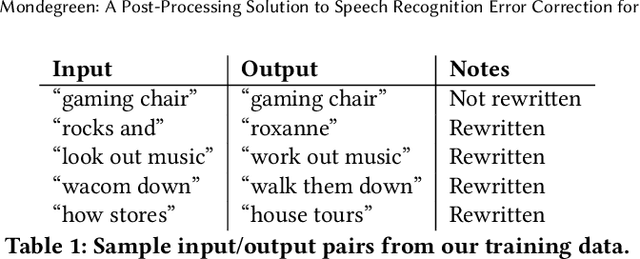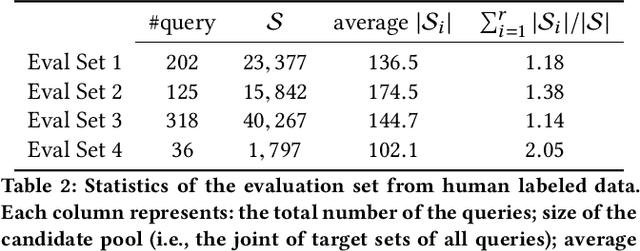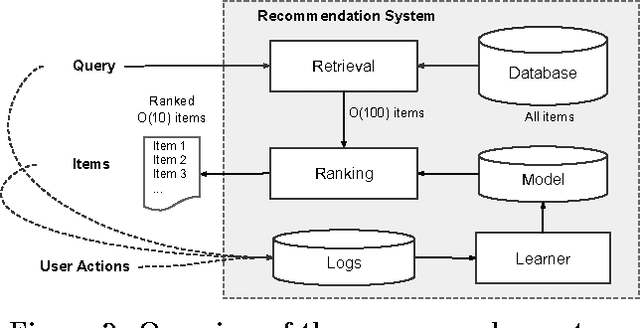Tushar Chandra
Mondegreen: A Post-Processing Solution to Speech Recognition Error Correction for Voice Search Queries
May 20, 2021



Abstract:As more and more online search queries come from voice, automatic speech recognition becomes a key component to deliver relevant search results. Errors introduced by automatic speech recognition (ASR) lead to irrelevant search results returned to the user, thus causing user dissatisfaction. In this paper, we introduce an approach, Mondegreen, to correct voice queries in text space without depending on audio signals, which may not always be available due to system constraints or privacy or bandwidth (for example, some ASR systems run on-device) considerations. We focus on voice queries transcribed via several proprietary commercial ASR systems. These queries come from users making internet, or online service search queries. We first present an analysis showing how different the language distribution coming from user voice queries is from that in traditional text corpora used to train off-the-shelf ASR systems. We then demonstrate that Mondegreen can achieve significant improvements in increased user interaction by correcting user voice queries in one of the largest search systems in Google. Finally, we see Mondegreen as complementing existing highly-optimized production ASR systems, which may not be frequently retrained and thus lag behind due to vocabulary drifts.
Zero-Shot Heterogeneous Transfer Learning from Recommender Systems to Cold-Start Search Retrieval
Aug 19, 2020



Abstract:Many recent advances in neural information retrieval models, which predict top-K items given a query, learn directly from a large training set of (query, item) pairs. However, they are often insufficient when there are many previously unseen (query, item) combinations, often referred to as the cold start problem. Furthermore, the search system can be biased towards items that are frequently shown to a query previously, also known as the 'rich get richer' (a.k.a. feedback loop) problem. In light of these problems, we observed that most online content platforms have both a search and a recommender system that, while having heterogeneous input spaces, can be connected through their common output item space and a shared semantic representation. In this paper, we propose a new Zero-Shot Heterogeneous Transfer Learning framework that transfers learned knowledge from the recommender system component to improve the search component of a content platform. First, it learns representations of items and their natural-language features by predicting (item, item) correlation graphs derived from the recommender system as an auxiliary task. Then, the learned representations are transferred to solve the target search retrieval task, performing query-to-item prediction without having seen any (query, item) pairs in training. We conduct online and offline experiments on one of the world's largest search and recommender systems from Google, and present the results and lessons learned. We demonstrate that the proposed approach can achieve high performance on offline search retrieval tasks, and more importantly, achieved significant improvements on relevance and user interactions over the highly-optimized production system in online experiments.
Reinforcement Learning for Slate-based Recommender Systems: A Tractable Decomposition and Practical Methodology
May 31, 2019


Abstract:Most practical recommender systems focus on estimating immediate user engagement without considering the long-term effects of recommendations on user behavior. Reinforcement learning (RL) methods offer the potential to optimize recommendations for long-term user engagement. However, since users are often presented with slates of multiple items - which may have interacting effects on user choice - methods are required to deal with the combinatorics of the RL action space. In this work, we address the challenge of making slate-based recommendations to optimize long-term value using RL. Our contributions are three-fold. (i) We develop SLATEQ, a decomposition of value-based temporal-difference and Q-learning that renders RL tractable with slates. Under mild assumptions on user choice behavior, we show that the long-term value (LTV) of a slate can be decomposed into a tractable function of its component item-wise LTVs. (ii) We outline a methodology that leverages existing myopic learning-based recommenders to quickly develop a recommender that handles LTV. (iii) We demonstrate our methods in simulation, and validate the scalability of decomposed TD-learning using SLATEQ in live experiments on YouTube.
Wide & Deep Learning for Recommender Systems
Jun 24, 2016



Abstract:Generalized linear models with nonlinear feature transformations are widely used for large-scale regression and classification problems with sparse inputs. Memorization of feature interactions through a wide set of cross-product feature transformations are effective and interpretable, while generalization requires more feature engineering effort. With less feature engineering, deep neural networks can generalize better to unseen feature combinations through low-dimensional dense embeddings learned for the sparse features. However, deep neural networks with embeddings can over-generalize and recommend less relevant items when the user-item interactions are sparse and high-rank. In this paper, we present Wide & Deep learning---jointly trained wide linear models and deep neural networks---to combine the benefits of memorization and generalization for recommender systems. We productionized and evaluated the system on Google Play, a commercial mobile app store with over one billion active users and over one million apps. Online experiment results show that Wide & Deep significantly increased app acquisitions compared with wide-only and deep-only models. We have also open-sourced our implementation in TensorFlow.
 Add to Chrome
Add to Chrome Add to Firefox
Add to Firefox Add to Edge
Add to Edge